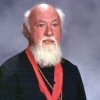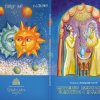Mateja Matejić (born 1924) (Serbian Cyrillic: Матеја Матејић) - Priest of Serbian Orthodox Church, emigrant since 1945, and the Professor Emeritus of Slavic languages and Literatures at Ohio State University. Matejic graduated from the Slavic Department in the USA where he received his Ph.D.
Mateja Matejić is a founder of the Chilandar scientific project at the Ohio State University in Columbus, where he has been teaching Slavic languages since 1968. He is a founder and director of the publishing house Kosovo, as well as the editor of the Path of Orthodoxy magazine.
This renowned translator and anthologist (of the Medieval and foreign poetry) and author of several books of poems best spread the spiritual tradition of the Serbian Orthodox people around the world by means of his two books: An Anthology of Medieval Serbian Literature (as co-author), The Holy Mount and Hilandar monastery.
In September 2000, the V. Rev. Dr. Mateja Matejic, founder of the Hilandar Research Library at Ohio State and the first director of the Resource Center for Medieval Slavic Studies, received two awards from the Serbian Orthodox Church. The first was the St. Sava Medal, the Serbian Church's highest award, which was presented to him in Ohio. The next day, in Belgrade, a Gramata from Patriarch Pavle of the Serbian Orthodox Church was also read and awarded.
Selected Bibliography:
- Na stazama izbeglickim: srpsko pesnistvo u izbeglistvu 1945-1968 (On Exile Paths: Serbian Poetry Diaspora 1945-1968) in Serbian co-author Bor. M. Karapandzic (1969)
- A Brief History of the Russian Orthodox Church in English
- Biography of Saint Sava in English (1976)
- An Anthology of Medieval Serbian Literature in English co-author Dragan Milivojevic (1978)
- The Holy Mount and Hilandar Monastery in English (1983)
- Relationship between the Russian and the Serbian Churches through the centuries in English {1988]
- Kosovo and Vidovdan After Six Hundred Years in English (1992)
- Troubles in Chiiandar in Serbian (1994)
- Scriptural instructions for Christian life in English (1997)
- Hilandar manuscript / Hilandarski rukopis in English and Serbian (1998)
- Remaining Unchanged in Serbian (1998)
- The oldest Christian liturgy in English (1999)
- A festschrift for Leon Twarog in English co-editor Irene Masing-Delic (2001)
From Wikipedia





